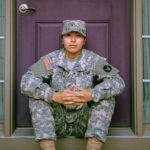
Instead of associating soldiers and their families only on patriotic holidays, think of them when we see God’s presence in our lives.
By Kate Shellnutt
When America’s patriotic holidays roll around, military families enjoy waves of star-spangled gratitude.
The tribute to fallen soldiers on Memorial Day. The Facebook posts declaring us “the land of the free because of the brave” on Independence Day. The text messages and “thinking-of-you” notes on Veteran’s Day.
As a former Navy brat and current Army wife, I can tell you those efforts are good and appreciated. As a Christian, though, I believe the church is called to more than gestures of support tied up in red, white and blue.
After all, “love thy neighbor” doesn’t suggest we extend love on special occasions. This command of our faith requires us to know our neighbors and their needs. We love deeply to reflect the God who deeply loves us.
Loving the 1 percent
While this intimate call to love applies to everyone in our congregations, it can be particularly hard to know how to support the military and their families.
Less than 1 percent of our population now serves in the Armed Forces, a figure that’s dwindled since the days of Vietnam and World War II, according to the Pew Research Center. Americans today are far less likely to have friends, family and neighbors in the service or to understand the current demands of the military.
In some ways, the military lifestyle is to blame. The cycles of moves and deployments hinder attempts to form meaningful relationships.
Even when military families make an effort to get to know people, they often are reluctant to open up or ask for help. Military personnel and spouses spend years building up emotional fortitude. They get used to the inner voice repeating, “You can get through this” as they slog through separations and other challenges.
Those barriers to community reveal how much our nation’s military families—active duty, retired, National Guard and reserves—need the church.
In congregations near military installations, the crew cuts and camouflage throughout the pews are telltale signs. In other areas, churches may discover families with ties to the military through conversations, prayer requests, yellow ribbons or bumper stickers in the parking lot.
No matter where we are, churches should strive not merely to fly our colors and offer our thanks, but to welcome military families into the kind of deep community that teaches them to rely on others and, more importantly, on God.
Faith through uncertainty
As the U.S. continues its troop withdrawal from Afghanistan, Americans may be tempted to breathe a sigh of relief on behalf of our military. But now’s not the time to wind down our outreach or take the soldiers off our prayer lists.
Military families face an unpredictable future. Instead of year-long deployments to Iraq or Afghanistan, some personnel will take on shorter overseas assignments with little notice and quicker turnarounds. Some will remain stateside and still end up spending months away for skills courses.
Military spouses will tell you: these more sporadic trips bring more chaos than the long ones. More training. More goodbyes. More periods of readjustment after each return. A feeling of uncertainty and helplessness pulses through the rhythms of military life with each break in the routine.
I’ve found the greatest struggles of military life parallel the truths of Scripture, most glaringly—we are not in control.
As Christians, we can relate. We all go through difficult times, humbled to realize we don’t know what comes next. We try to rest in God’s sovereignty. The Bible tells us again and again the Lord is our refuge, He has a plan and He will always be with us.
Military families find themselves in places of dramatic transition more often than most of us and constantly need these reminders. Decompressing after a homecoming, moving to a new base, grieving a death, assuming a higher rank, welcoming a baby, dealing with discord in marriage, healing after an injury and even leaving the military can all prompt emotional and spiritual upheaval.
While fellow Christians may not have experienced a specific military situation, they do know firsthand the promise of the gospel and the power of God over even the most trying times. These truths should drive our outreach.
Family matters
Recognizing the differences between military and civilian life, churches may think that in order to reach service members, spouses and vets, they must create a special “military ministry.” Yet, some of the military’s most pressing, practical needs line up with the church’s existing priorities: upholding marriages and strengthening families.
Distance can rattle military marriages, as well as relationships between soldiers and their children. A September 2013 study from the RAND Corporation found that longer deployments can lead to an increased risk of divorce. In Christian community, we have the chance to draw families closer together by drawing them closer to the Lord.
I love how my church publicizes free marriage counseling available through our pastoral team, making it easy for couples to know where to turn when they need help. Churches can also offer babysitting for couples to go on date nights.
And, when soldiers deploy, churches can help them keep connected by sending audio files of sermons on a thumb drive—accessible even in areas with limited Internet access.
In the lonely days when families are missing their husband or wife, their dad or mom, Christian community can step in with fellowship, service and prayer. The church helps by doing what it has done since its earliest days: gather, eat, “rejoice with those who rejoice; weep with those who weep” (Romans 12:15).
Remembering military families
We share more with the military than our American heritage. Instead of associating soldiers and their families only on patriotic holidays, let’s think of them throughout the year when we see God’s presence in our lives.
In our own tough times, when we feel everything spiraling out of control, let’s remember the instability of military life and pray that soldiers and spouses recognize His sovereignty over each transition.
As God binds together our families in love, let’s remember all those who spend months apart to serve and pray they be united safely again.












